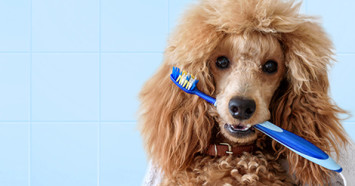
Providing dental care for pets should be a priority for owners, but how often should you get your dog’s teeth cleaned? According to most veterinarians, about once a year is ideal. But if I’m being honest, I’ve never done it that often with my dogs. At the most, they’ve gone every two years, or when an emergency has popped up.
How Often Should You Get Your Dog’s Teeth Cleaned?
Different dogs have different needs, so it’s important to talk to your vet about when it’s time for your dog’s dental cleaning. Here are some factors that can influence the schedule of professional dog dentals under anesthesia.
Age of your dog
As you might be able to guess, older dogs usually need more dental attention than younger ones – but that’s not always the case. Dogs as young as two years old might need a dental cleaning (especially smaller dogs, more to come on that below). But keep in mind: although many dogs don’t need a dental before age of six or seven, getting started early is a good way to keep up on your dog’s oral health.
If you make sure to do dentals regularly while your dog is healthy, he’ll be much better off in the event you have to stop doing them later on due to declining health. And while you don’t want to put your senior under anesthesia more than you have to, he can still go under safely, even with underlying health conditions, the vet may just have to adjust anesthesia protocols. This is why pre-procedure blood work and exams are so important.
Bottom line: there’s not necessarily an “upper limit” for dentals (our 13-year-old Chihuahua mix just had one); it’s more about looking at age as one part of the whole picture.
Dog Breed
Smaller dogs need dental cleanings more often than larger dogs, and there are several reasons why. First, their teeth, relative to their mouths, are big, which causes major overcrowding. Smaller breeds are also known for hanging onto their baby teeth in addition to their adult teeth (we see it a lot in Yorkies), which adds to the crowding. That, in turn, leads to more places tartar can build up. Given that their roots are very shallow, any level of periodontal disease can impact them more severely than larger dogs. Short-nosed dogs like Pugs, Brussels Griffons, Shih Tzus, and Bulldogs are particularly afflicted.
Small dogs are also prone to deformed permanent teeth, which gives more places for tartar to hide, and oddly-shaped roots often lead to endodontic disease.
Another concern for all dogs, though most common in small breeds, is malocclusion. That’s where the jaws aren’t aligned properly, often bred that way on purpose. This causes abnormal alignment and contact that leads to dental disease. Dogs of all sizes, such as Greyhounds, Collies/Shelties, and Dachshunds are notorious for this.
Daily Maintenance and Routine Care
Brushing your dog’s teeth and letting him chew on raw bones is an important part of his dental health. If you can only get one of these accomplished, so be it – but do it often. There are tons of options out there, so find something that works for you and your dog. We never could get our dogs to let us brush their teeth. It’s something you can train by starting early, being consistent, and rewarding them.
You can use brushes or gloves, with or without paste. You can even just use a bit of wet baking soda on a gauze pad and wipe his teeth with that. There are also dental treats and supplements you can offer your pup. Experiment to see what they like best! If your dog is getting daily (or close to daily) bone chewing and/or brushing, they will need dentals far less often than dogs who don’t get this type of care and maintenance.
Dog's Diet
Your dog’s diet influences his oral health. Be careful with starchy foods that can get caught in the crevices between their teeth. A lot of people recommend raw diets with lots of raw bones for this reason. But even if you don’t feed raw, you can give your dog raw veggies as snacks and treats, which are great for daily crunching. If your dog has a diet of starchy kibble or that’s a bit more grain-based, he will definitely need more dental care. Regular brushing will really help with this. If you’re not doing that, it could speed up the time between dental procedures. If you know you aren’t going to brush your dog’s teeth a lot, you might want to consider a diet high in raw bones and veggies.
Wellness Pet Plan Helps with Preventative Teeth Cleaning
When considering teeth cleaning plans for your dog there are a few options to help prepare for your pet’s routine health care to keep them happy and healthy. Most comprehensive insurance policies for pets only cover accidents and illnesses, not dental care. That is why Embrace offers our pet wellness † preventative care plan as a reimbursement plan to pair with your accident and illness policy. With Wellness Rewards, your dog’s teeth cleaning can be a reimbursable item from your yearly budget, similar to a health savings account.